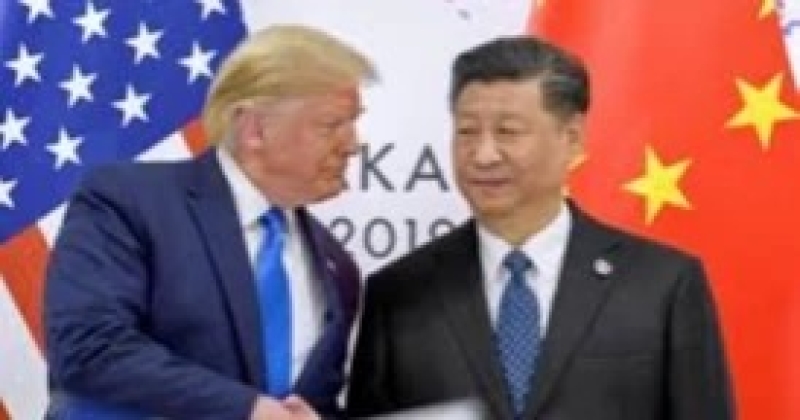- WHO Says Traditional Medicine Use Surges Worldwide |
- UN Report Calls for New Thinking to Secure a Sustainable Future |
- BNP moves to finalise seat sharing as alliance friction grows |
- BNP plans universal 'Family Card' for all women: Tarique Rahman |
- Tangail saree weaving gets recognition as intangible cultural heritage |
Trump warns of 100% tariff on Chinese Imports, U.S. Tech export restrictions

US President Donald Trump with Chinese President Xi Jinping. Ap Photo_11zon
President Donald Trump on Friday threatened to impose a 100% tariff on all Chinese imports starting November 1 — or possibly sooner — intensifying trade tensions that could reach levels last seen in April when fears of a global recession were sparked.
The warning came in response to new Chinese restrictions on exports of rare earth minerals — essential components in high-tech and defense equipment. Trump also questioned the value of a planned meeting with Chinese President Xi Jinping during his upcoming visit to South Korea, though he later clarified the meeting wasn’t officially canceled.
Speaking from the White House, Trump said, “We’ll see what happens,” suggesting there’s still time to avoid imposing the tariff hike.
China’s New Controls on Rare Earth Exports
On Thursday, Beijing imposed fresh restrictions on the export of rare earth elements, requiring companies to obtain special licenses for shipments abroad. The new rules also ban exports of rare earth-related technologies used for military applications.
Trump called the move “shocking” and claimed it was further evidence of China’s “hostile” posture, accusing the country of holding global supply chains hostage. Rare earth minerals are vital to a wide range of U.S. industries — from electronics and semiconductors to defense systems.
In a social media post, Trump announced the U.S. will slap a 100% tariff on Chinese goods starting November 1, 2025 — or earlier, depending on China's actions. He also said the U.S. would impose its own export restrictions on critical American software.
The Chinese Embassy in Washington did not immediately respond to requests for comment.
Market Reaction and Economic Impact
U.S. markets responded sharply to the threat, with the S&P 500 falling 2.7%, marking its worst single-day drop since April — the last time Trump raised similar tariff threats. Although markets closed before Trump fully detailed his plans, investor anxiety was already evident.
With a 30% tariff already in place on many Chinese imports, analysts warned that doubling those rates could disrupt U.S.-China trade even further and put additional strain on the global economy.
Trump’s use of high-stakes threats is not new. Investors have even coined the term “TACO” — “Trump Always Chickens Out” — reflecting a belief that he often backs away from extreme positions under pressure.
Nonetheless, such tariffs could worsen inflation at a delicate economic moment, with job growth weakening and concerns over a potential government shutdown already mounting.
Trade Talks Remain Uncertain
The U.S. and China had previously agreed to reduce tariffs after negotiations in Switzerland and the UK. However, Beijing’s recent actions — including its latest export controls — have reignited tensions.
Complicating matters, a backlog of export license applications from China’s earlier controls on rare earth elements remains unresolved, further straining global supply chains, the European Union Chamber of Commerce in China said.
The U.S.-China trade conflict also includes disputes over semiconductor restrictions, agricultural exports like soybeans, and reciprocal port fees that are set to take effect next Tuesday.
Experts Say There’s Still Time to De-escalate
Although Trump hinted that his meeting with Xi in South Korea may be off, it hasn’t been officially canceled. The meeting is scheduled during a larger Asia trip that includes stops in Malaysia, Japan, and South Korea — ahead of the Asia-Pacific Economic Cooperation summit.
Sun Yun, a China expert at the Stimson Center, believes China’s reaction was a response to recent U.S. sanctions and shipping fees, but she sees potential for both countries to step back from the brink. “De-escalation has to be mutual,” she said.
Gracelin Baskaran of the Center for Strategic and International Studies noted that China has significant leverage, controlling 70% of rare earth mining and over 90% of magnet production — both vital for defense and tech.
“These restrictions hurt the U.S. industrial base and give China a strong hand in negotiations,” she said.
Craig Singleton of the Foundation for Defense of Democracies warned the tariff threat could spell the collapse of the fragile trade truce between the two countries.
“Economic warfare is no longer just a figure of speech,” he said. “Both sides are pulling out their economic weapons, and neither seems willing to blink.”

